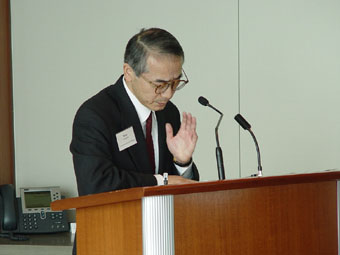Consul General of Japan Hisao Yamaguchi took a comparative view of Japanese and Canadian foreign policy, with particular focus on how the two countries manage their relations with the United States, at a lunchtime gathering organized by the Canada-Japan Society of Toronto on Feb. 24. About 35 people filled the large board room in the office of the law firm McMillan and Binch, which hosted the lunch. Among the audience were Ontario Deputy Minister of Development and Trade Don Black, CJST President Craig Martin and McMillan and Binch Partner John Craig, who sits on the Sakura Committee with Mr. Yamaguchi.
"Many friends of the Consulate General of Japan are members of the CJST, said Mr. Yamaguchi at the outset of his speech, "and I am always appreciative of their support of out activities."

Consul General of Japan Hisao Yamaguchi (left) and Canada Japan Society President Craig Martin
Mr. Yamaguchi said it was his impression that Canada invests a lot of its national identity in its national policy. He explained that overall, Canada and Japan share a similar orientation toward foreign policy, that they "focus on international laws and institutions, desiring to arrive at resolutions of issues through cooperation among countries rather than raw force. At the same time, they devote considerable effort to managing their relations with the United States."
The ways in which they manage these relations, however, are different he said, because Canada-U.S. relations are founded on "because's" -- "because of the common cultural and historical roots; because of their common language; common television programmes, coffee shops, supermarkets; because of their natural security and economic integration; because of their shared experiences in World Wars" -- while Japan-U.S. relations are characterized by "despite's" -- "despite the vast historical, cultural and ethnic differences; despite Pearl Harbour; despite Hiroshima and Nagasaki; despite post-war economic rivalry." This results, he said, in differences such as the ways in which the two countries respond to such matters as Ballistic Missile Defence and the Iraq war. "Canada chose to put distance with its southern neighbour when it came to these particular matters. Japan chose the path of cooperation."
He described Japan-U.S. relations as "something that is forged as the imperative for Japan's security, economic and foreign policy interests."
"Among the people of intellectual leadership, the implications of allowing anti-American sentiments to gain strength were generally understood," he said, explaining that the Japan-U.S. security alliance could be threatened, possibly forcing Japan to arm itself, which in turn would cause further tensions with the U.S. as well as with Japan's immediate neighbours in the Pacific.
Mr. Yamaguchi went on to explain that Japan does not express its national identity in its foreign policy due to cultural unfamiliarity with the use of verbiage, a government system in which the task of explaining policy falls on bureaucrats, as well as the ambivalence the Japanese feel about their country's role in modern history and in relation to the Second World War. "Simply put, how can we present national identity as the centerpiece of our foreign policy, when we cannot fully believe in ourselves?" he asked.
On the other hand, Canada, he said, uses foreign policy to express its national identity. "A distinct nationhood that is recognized and respected in the international community is a valid national interest, which is intimately tied to the quest for national identity undertaken by Canadians," he explained, adding that the prominence the country gained in the postwar period seems to serve "as a standard for Canadians as to what they are able to, or even should, achieve."
"However," he cautioned, "in Canada, discussion of its identity usually involves the way in which it faces the United States. This becomes such a poignant issue that the quest for national identity in Canada tend to nurture rhetoric that is conscious of Americans, and some of this rhetoric can easily turn anti-American."
Mr. Yamaguchi's basic principle was that, "the morality of a nation should not be confused with the morality of an individual, and legitimate foreign policy must based on stringent definition of national interests." He explained that, "Claiming one's country's rightful place within the international community entails an awareness of the limitations of that country, as well as an accurate grasp of the existing circumstances. This kind of realism, however unsatisfactory outcome it can bring to a nation in the short term, is the key to serving national interests in the long run."